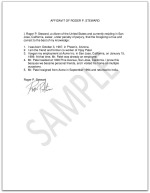

When filing Form N-600 to apply for a Certificate of Citizenship, you will need to submit evidence to corroborate your claim to U.S. citizenship. In some cases, particularly if much time has passed, it may be difficult to gather certain types of evidence. Alternative evidence in the form of an affidavit from a third-party familiar with the situation may help in these scenarios. The following article covers some typical scenarios and provides a sample N-600 affidavit.
If you were born outside the United States but acquired U.S. citizenship through a parent, you’ll likely need to demonstrate that your parent met certain requirements. Even if your parent was born a U.S. citizen, he or she generally must have lived in the U.S. (or its outlying possessions) for a certain period of time. The length of time depends on the year of the applicant’s birth.
Prepare your N-600 correctly and affordably with CitizenPath. The attorney-reviewed software guides you through the application and provides help to answer questions like this one. And personalized filing instructions help you to file your application today knowing that you did everything right! No credit card or signup required to get started. Try it before you buy it >>
Applicants born on or after November 14, 1986, will need to demonstrate that their parent was physically present in the United States for at least 5 years before your birth and for at least 2 years after he/she turned age 14. On the other hand, applicants born on or after December 24, 1952 and before November 14, 1986, will need evidence that the U.S. citizen parent was physically present in the United States for at least 10 years before your birth; and for at least 5 years after he/she turned age 14. The immigration laws covering acquisition of citizenship changed several times before 1952. If your birth was prior to December 24, 1952, it’s best to have an immigration attorney analyze your specific case.
If you are claiming that you derived U.S. citizenship from a parent after your birth, you’ll need to demonstrate that you live (or lived) within the United States in the physical and legal custody of the U.S. citizen parent before the age of 18.
Generally, a variety of documents may be used to prove residence in the United States. Evidence may include but is not limited to:
When ample evidence is not available, alternative evidence such as an affidavit may be provided. Primary evidence is always preferable. But an affidavit can help support limited primary evidence.
The person who writes an affidavit is an “affiant.” Affiants may be relatives of the applicant and do not have to be U.S. citizens. In this sample N-600 affidavit, the affiant is a person who has first-hand knowledge of the parent’s residence and physical presence during a specific time frame. This is an example; your affiant will need to write a unique statement that is specific to your situation.
The N-600 affidavit should always be typed and signed by the affiant. The affidavit does not need to be notarized. If it is not notarized, it should include a statement that swears to the letter’s validity, “I swear, under penalty of perjury, that the foregoing is true and correct to the best of my knowledge.” The affiant must be willing to appear in person if necessary.
Please note that there is more than one way to write an affidavit. Various attorneys may have their own preferences on how to write an affidavit to support an N-600 application.

Sign up for our FREE newsletter to get the latest tips and information related to your immigration journey. You’ll also
SAVE 10%
on all immigration services